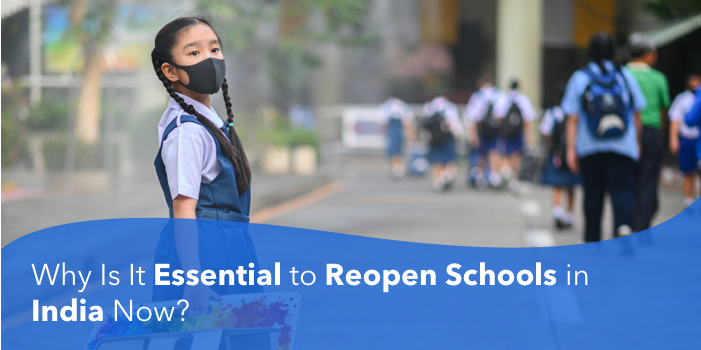Why Is It Essential to Reopen Schools in India Now?

Though the Covid-19 pandemic has changed our lives forever, yet it has resulted in one positive thing – it has helped generate a greater appreciation for the importance of public schools. With parents struggling to keep things going with their child’s academics at home because of school closures, the recognition for the nurturing and caretaking roles that schools play has increased tenfold. As the young ones are struggling to learn from home, parent’s recognition and gratitude for the role of teachers in the well being of their children has increased greatly. With communities struggling to take care of their vulnerable children, decision makers are busy developing new mechanisms for delivering possibly everything from food to healthcare and education.
It is very important to look beyond the immediate issues to what will he possible for the education sector on the other end of the Covid-19 pandemic. It is really hard to imagine another moment in history where the role of education in the social and economic sectors will be so well understood. As schools are reopening gradually over the country, It is now important to formulate a vision on how education will emerge stronger from the global crisis. This will help introduce a new path for capitalizing on the education sector’s newfound support for almost every community across the globe.
The nationwide lockdown in the past few months have closed more than 1.5 million schools and have had an impact on more than 24 crore students all across India. It has forced policy makers, educators and peers to make a choice between education and the health of their children. While in other countries, schools serve as the center for learning and the primary purpose is imparting education on a certain curriculum, the same thinking cannot however be applied in India. Over the past few years, rural child care centers in India have provided almost 6.4 crore children under six years with nutritious meals and vaccinations. Mid-day meals are provided to more than 9.8 crore children who are studying in government schools and this has kept malnutrition at bay among a large number of rural children.
Recent studies show that around 2 lakh children have missed on their BCG and pentavalent vaccines owing to the lockdown. Not just are children being immunized but at the same time they are forced to be sent to work by families who are standing at the precipice of poverty. It is most likely that the children who are starting to work now will never return back to schools. Temporarily closing down schools also increases the already exciting issues of child trafficking and abuse. Children who are staying home are now more prone to abusive family members who now neither has the escape of schools nor the support of friends and teachers. In the last few months, the helpline number 1098 has seen a 50 percent increase in the number of calls received during the lockdown. Out of 53 NGOs surveyed by a foundation, it has been found out that 89 percent children feared a risk of trafficking and 64 percent anticipated an increase in child marriage during the lockdown.
Apart from providing education, schools also play an important role in enabling parents, especially mothers to find meaningful work for themselves. The extended closure of schools are forcing mothers to quit their jobs and they are getting occupied with full time child care. This will go a long way in accelerating the declining female labor percentage of India. Moreover, losing an additional source of income will indirectly force households back into poverty. Well, learning during the school closures has also suffered a great deal. Even though government schools and teachers are working hard to make alternative modes of educations accessible to all the students, structural problems around the access to the internet has always existed. Now, as schools plan to reopen, it is time to create plan for returning to school. The UNICEF’s Framework for Reopening of Schools which was released on June 2020 offers a detailed guidance on this and divides the reopening into three different phases: before reopening, during reopening and post reopening. In the first stage, schools would be identified for reopening based on the local transmission rate. Schools are to open in phases on certain days of the week. Along with this, guidelines around health and wellness and social distancing needs to be followed. Policy makers need to plan classes in shifts and this model is already followed in Andhra Pradesh.
This pandemic has risked not just the education but the health and wellness of the nation’s children as well. It is now time that we safely reopen our schools and secure the future of our children. In these times of reopening of schools, ARC has come up with a wide suite of graphics and Covid-19 safety posters to help school authorities impart important health and hygiene information to students, parents and staff.


